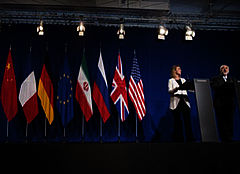The Nuclear Crisis Could Have Led to War
» Rouhani Asserts:
While Iran’s president has been strongly stressing in recent weeks that the country has distanced itself from the “shadow of war” because of the nuclear agreement reached between Tehran and six major world powers in Vienna in July, his foreign minister has been raising a louder critical voice against Israel’s actions against the nuclear agreement which has yet to be finally endorsed and implemented. At the same time, during the last session of the Governing Board of the IAEA in Vienna, the director general of the agency implicitly rejected published reports that Iran would itself be sampling the soil at the Parchin military base where Iran is suspected to have conducted some nuclear related tests in the past. Iran’s representative at the agency warned against any leaks of information regarding the “secret” agreement between Tehran and the IAEA.
Rouhani is currently on a provincial tour and in his latest public remarks in the town of Hamedan stressed again that the nuclear agreement that his administration signed with the six world powers in July has resulted in the lowering of the likelihood of “war” with Iran. “After 23 months of work and continuous negotiations by the children of the revolution and heroic diplomats, we have come to a place where the horrifying shadow of war that had been looming over the people has been removed and true security has been returned to the country,” he said.
This is the first time Rouhani mentions war as a possible outcome of the direction of events prior to the nuclear agreement. As a presidential contender, he put ending the nuclear stand-off with the world and the lifting of international sanctions as his topmost priority and platform, which echoed among the populace to defeat his hardline rivals.
While he did not specify when was the shadow of war looming over the Iranian people but deputy foreign minister Abbas Araghchi had told the leaders of the state-run national radio and television organization privately that the military threat against Iran reached its height between the years 2006 and 2007. “People may not know the specifics, but our friends in the Revolutionary Guards and the military know that there were nights in 2006 and 2007 when we feared that by next morning they may have laid all the elements necessary for an attack on Iran outside the country,” he said. Araghchi, who was a senior member of the foreign ministry even during Mahmoud Ahmadinejad’s presidency, continued, “In our meetings our military friends explained on maps the type of aircraft that had been stationed on various military bases and that the only issue that was left for a strike was the political decision of the US president.
In 2007, international media gave a high probability that the US could attack Iran’s nuclear installations, something that did not materialize. With Barack Obama’s presidential victory, his administration chose targeted sanctions over military threats against Iran which ultimately led to the talks between Iran and the 6 major world powers known collectively as the P5+1, even though the talks had been initiated 2 years earlier under direct ayatollah Khamenei’s directives during Ahmadinejad’s final years in office.
Last week, leaked audio conversations revealed that Israeli leaders had 3 plans to attack Iran’s nuclear installations in the years 2010 and 2011. This is contrary to the view that a number of Iranian analysts had promoting in that it was the nuclear policies of Iran’s supreme leader that had brought security to Iran in recent years.
Israeli Prime Minister Benjamin Netanyahu has been a staunch opponent of the July Vienna nuclear deal and has reiterated that his country maintains the right to defend itself against threats from Iran.
Iran’s Zarif explained his perspective on Netanyahu’s opposition to the nuclear deal by saying that Israel was in reality unhappy because it failed to weaken Iran’s security.
At the IAEA, Director Amano confirmed that his agency and Iran had a secret agreement for resolving the outstanding nuclear issues between them but added that the mechanisms in it provided for satisfactory confidence building measures. He added that no “new precedents” had been set on the subject of inspections in the Tehran-IAEA agreement, implying a rejection of what the AP had reported that Iran was allowed to itself inspect its facilities and provide the results to the IAEA.
At the same time, Iran’s representative at the IAEA told reporters that the nuclear watchdog had to take the necessary measures to protect classified information, adding any information leaks would not be acceptable by anyone.

